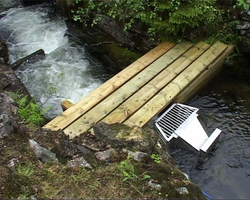Difference between revisions of "Monitoring facilities"
Bendikhansen (talk | contribs) |
Bendikhansen (talk | contribs) |
||
| (7 intermediate revisions by the same user not shown) | |||
| Line 1: | Line 1: | ||
| + | NOTE: This is not a measure in itself. Maybe an MTD? | ||
| + | [[file:icon_upstream.png|right|150px|link=[[Upstream fish migration]]]] | ||
=Introduction= | =Introduction= | ||
[[file:mechanical_fish_counter_gaula.png|thumb|250px|Figure 1: Mechanical fish counter in the River Gaula in Norway (Photo: Anders Lamberg)]] | [[file:mechanical_fish_counter_gaula.png|thumb|250px|Figure 1: Mechanical fish counter in the River Gaula in Norway (Photo: Anders Lamberg)]] | ||
| Line 31: | Line 33: | ||
=Classification table= | =Classification table= | ||
| − | [[category: | + | =Relevant MTDs and test cases= |
| + | |||
| + | =Relevant literature= | ||
| + | |||
| + | [[category:Needs improvement]] | ||
Latest revision as of 19:49, 30 September 2020
NOTE: This is not a measure in itself. Maybe an MTD?
Contents
Introduction
Monitoring of fish migration is a measure to:
- verify the function of upstream fish passages and
- support fisheries management and fish conservation.
A fish passage is optimal for monitoring of the fish migration since the fish is restricted to migrate within a small and well-defined volume of water. Typically, monitoring and enumeration of fish should be done at the outlet of the fish passage, giving the true number of fishes that pass a migration barrier. The most common monitoring systems are:
- Mechanical counting systems, such as gates triggering some sort of switch
- Video cameras
- Sonar devices
- Optical enumeration systems based on diodes
- Manual counting and registration
- Conductivity sensing
- PIT-tagging (Passive integrated transponders)
There are also systems combining these techniques, such as mechanical counting with video trigging. In addition to counting of fish passing fishways, monitoring of upstream migration may cover larger areas and time periods to explore the behaviour of fish on their upstream migration. This can be carried out with radio or acoustic telemetry techniques, where receiver antennas in strategic places register the position of tagged fish with different accuracy levels. Both PIT and telemetry monitoring requires that fish is captured and tagged before monitoring can start.
Methods, tools, and devices
During planning
Planning of monitoring systems must include mapping of the fish society subject to monitoring. The monitoring system must be adapted to the specific fishway site and the relevant monitoring systems and products must be evaluated. For instance, it might be important that the monitoring is situated at a location without air bubbles in the water.
During implementation
The implementation of monitoring a system must be conducted in collaboration with the supplier or manufacturer and should be installed by the vendor or supplier. Special attention must be payed to the placement of the system. Enumeration systems should be placed in the upper part of a fishway to ensure true migration success.
During operation
Monitoring systems and appurtenant software should be maintained according to manufacturer's manual.
